Copyright
©The Author(s) 2025.
World J Psychiatry. Jan 19, 2025; 15(1): 101134
Published online Jan 19, 2025. doi: 10.5498/wjp.v15.i1.101134
Published online Jan 19, 2025. doi: 10.5498/wjp.v15.i1.101134
Figure 1 The gut-brain axis's role in obesity and depression.
This figure delineates the intricate mechanisms through which the gut-brain axis modulates obesity and depression, highlighting potential preventative and therapeutic strategies. Gut microbiota-derived metabolites and neuroendocrine signaling pathways are shown to exert significant influence on these conditions via the gut-brain axis. Adopting a healthy diet rich in protein and fiber and low in fat, supplementing probiotics and prebiotics, supplementing antioxidants, and restoring the balance of the hypothalamic-pituitary-adrenal axis are regarded as means to reduce the risk and symptoms of obesity and depression through the gut-brain axis. LPS: Lipopolysaccharide; 5-HT: 5-hydroxy tryptamine; SCFAs: Short-chain fatty acids; GABA: Gamma-aminobutyric acid; ARC: Arcuate nucleus; PYY: Peptide YY; GLP-1: Glucagon-like peptide-1.
- Citation: Fang RY, Pan XR, Zeng XX, Li ZZ, Chen BF, Zeng HM, Peng J. Gut-brain axis as a bridge in obesity and depression: Mechanistic exploration and therapeutic prospects. World J Psychiatry 2025; 15(1): 101134
- URL: https://www.wjgnet.com/2220-3206/full/v15/i1/101134.htm
- DOI: https://dx.doi.org/10.5498/wjp.v15.i1.101134









